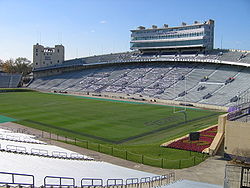Dyche Stadium
| Former names | Dyche Stadium (1926–1996) |
|---|---|
| Location | 1501 Central Street Evanston, IL 60201 |
| Coordinates | 42°3′56″N 87°41′33″W / 42.06556°N 87.69250°WCoordinates: 42°3′56″N 87°41′33″W / 42.06556°N 87.69250°W |
| Owner | Northwestern University |
| Operator | Northwestern University |
| Capacity | 47,130 (1997–present) 48,187 (1996) 49,256 (1982–1995) 48,500 (1975–1981) 55,000 (1954–1974) 52,000 (1949–1953) 47,000 (1927–1934) 25,000 (1926) |
| Surface |
Grass: 1926–1972, 1997–present Astroturf: 1973–1996 |
| Construction | |
| Broke ground | April 8, 1926 |
| Opened | October 2, 1926 |
| Renovated | 1996 |
| Expanded | 1949, 1952 |
| Construction cost |
$2.6 million (original) ($35.2 million in 2017 dollars) 1996 renovation: $20 Million |
| Architect | James Gamble Rogers |
| General contractor | J. B. French Construction Company |
| Tenants | |
| Northwestern Wildcats (NCAA) (1926–present) | |
Ryan Field is a stadium in Evanston, Illinois, United States on the campus of Northwestern University. It is primarily used for American football, and is the home field of the Northwestern Wildcats football team. The field opened in 1926 and holds 47,130 people. Prior to 1997, the stadium was named Dyche Stadium, for William Dyche, Class of 1882, former Evanston mayor and overseer of the building project. In 1997, the facility was renamed Ryan Field in honor of the family of Patrick G. Ryan, who was then the chairman of Northwestern's board of trustees. The renaming was made by the other members of the board in recognition of the Ryan family's leadership and numerous contributions to Northwestern, including the lead gift to the Campaign for Athletic Excellence, Northwestern's fundraising drive for athletic facilities.
At the time it was constructed, then Dyche Stadium was considered one of the finest college football stadiums in the country. The stadium originally consisted of two semi circular grandstands on either sideline, with the west (home) sideline having a small, curved upper deck whose 2 ends abut in matching concrete towers. The purpose of the curved grandstands was to maximize the number of fans sitting close to the action. Endzone seating was later added in the south endzone, and in 1952 McGaw Memorial Hall was built beyond the north endzone.
The stadium had an artificial turf surface from 1973 to 1996. Prior to the 1997 season, natural grass was installed and the playing surface was lowered approximately five feet to improve sight lines from the lowest rows of the stadium. Ryan Field is one of three stadiums in the Big Ten which does not have permanent light standards. The others are Michigan State's Spartan Stadium and Purdue's Ross-Ade Stadium.
The Chicago Bears hosted their first home game of the 1970 season at Dyche Stadium as an experiment; the NFL had demanded that the Bears move out of Wrigley Field because Wrigley's seating capacity was under 50,000. After Evanston residents petitioned city officials to block the team from moving there permanently, the Bears ended up moving to Chicago's Soldier Field the following year.
...
Wikipedia

